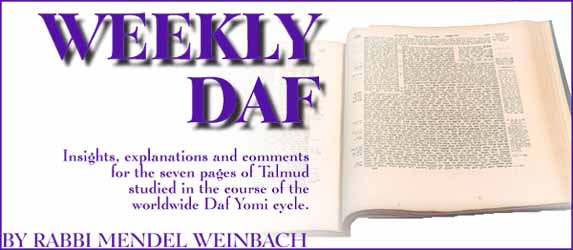Weekly Daf #30
Bava Metzia 72 - 78 - Issue #31
25 Elul - 2 Tishrei 5755 / 1 - 7 September 1994
This issue is dedicated in the memory of Mr.Seymour Pomerance O.B.M.
This publication is also available in the following formats:
![]()
![]()
![]() Explanation of these symbols
Explanation of these symbols
Getting Him Coming and Going
| The Rulings: | 1. If someone sells an item and then presses the buyer for full payment he may cancel the sale if such payment is not immediately forthcoming. | 2. If someone sells a donkey to another and receives the entire payment except for one zuz, which he is pressing the buyer to immediately pay him, he may cancel the sale even because of this small amount. | 3. If someone sells an item and receives the entire payment except for one zuz, which he is pressing the buyer to immediately pay him, he may not cancel the sale because of the small amount. |
| The Problem: | The basis for Rava's first ruling is the assumption that a man who presses for payment made the sale out of a desperate need for cash and the sale was conditional on receiving this cash upon demand. (Whereas the failure to pay immediately does not affect the finality of a sale when the seller does not press for immediate payment since it is assumed that he consented to the buyer's incurring a debt to him.)
But how do we resolve the apparent conflict between the last two rulings of Rava regarding the failure to pay the remaining zuz upon demand? | ||
| The Solution: | Ruling Two relates to a regular sale when the seller's insistence on immediate payment is interpreted as an expression of the desperate need for cash which forced him to make the sale. It matters not that only a zuz is involved because "one zuz means as much to him as many zuzim".
Ruling Three, however, applies to the sale of a field in poor condition which the seller is anxious to get rid of. Here the pressing for payment is not seen as a reflection on his desperate need for cash which could invalidate the sale but only as a precaution on the part of the seller to collect his money before the buyer realizes the poor purchase he made and tries to back out of the deal. | ||
The Prophet on Profit
 Those who lend money to other Jews on interest end
up losing more than they profit. (As the Talmud states on 71a
that the usurer's holdings eventually crumble with no hope for
recovery - Rashi.) Furthermore, they cast aspersions on
the wisdom of Moshe Rabbeinu and the truth of the Torah for their
behavior seems to say "Had Moshe Rabbeinu realized how much
profit there is in usury he would not have written a prohibition
against it". - Rabbi Shimon.
Those who lend money to other Jews on interest end
up losing more than they profit. (As the Talmud states on 71a
that the usurer's holdings eventually crumble with no hope for
recovery - Rashi.) Furthermore, they cast aspersions on
the wisdom of Moshe Rabbeinu and the truth of the Torah for their
behavior seems to say "Had Moshe Rabbeinu realized how much
profit there is in usury he would not have written a prohibition
against it". - Rabbi Shimon.
General Editor: Rabbi Moshe Newman
Production Design: Lev Seltzer
HTML Design: Eli Ballon
© 1994 Ohr Somayach International - All rights reserved. This publication may be distributed to another person intact without prior permission. We also encourage you to include this material in other publications, such as synagogue newsletters. However, we ask that you contact us beforehand for permission, and then send us a sample issue.
This publication is available via E-Mail
Ohr Somayach Institutions is an international network of Yeshivot and outreach centers, with branches in North America, Europe, South Africa and South America. The Central Campus in Jerusalem provides a full range of educational services for over 685 full-time students.
The Jewish Learning Exchange (JLE) of Ohr Somayach offers summer and winter programs in Israel that attract hundreds of university students from around the world for 3 to 8 weeks of study and touring.
Ohr Somayach's Web site is hosted by TeamGenesis
Dedication opportunities are available for Weekly Daf. Please contact us for details.







